Ethics and Governance: Panama Papers, Tax Minimization, and Ethics
VerifiedAdded on 2021/04/17
|10
|2922
|63
Essay
AI Summary
This essay analyzes the ethical implications of tax minimization by multinational corporations (MNCs) in light of the Panama Papers scandal, which exposed the use of tax havens by wealthy individuals and organizations. The paper distinguishes between legal tax minimization and unethical tax evasion, focusing on the responsibilities of businesses towards society and the government. It explores the ethical dimensions of hiding assets, tax avoidance, and the role of whistleblowers. The essay examines relevant ethical theories, including utilitarianism, Kantianism, and virtue theory, to assess whether MNC tax minimization is unethical or legitimate conduct. The paper concludes that, while tax minimization may be legal, it often falls short of ethical standards, potentially harming society and undermining the integrity of tax systems. The essay emphasizes the need for transparent tax policies and ethical business practices, arguing that organizations should prioritize their broader responsibilities beyond maximizing shareholder profits. The provided analysis offers a comprehensive overview of the ethical issues raised by the Panama Papers, providing valuable insights into governance and corporate responsibility.
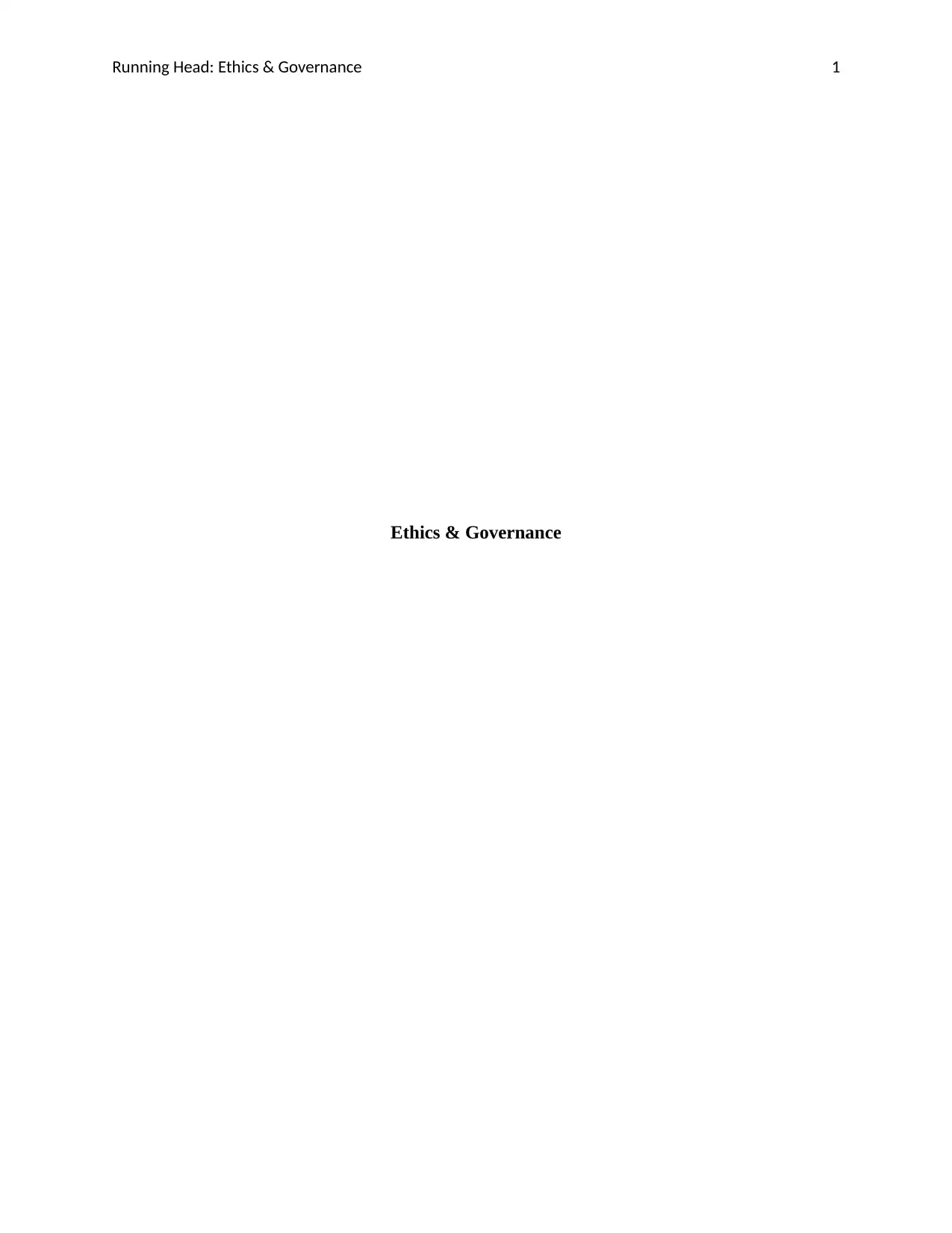
Running Head: Ethics & Governance 1
Ethics & Governance
Ethics & Governance
Paraphrase This Document
Need a fresh take? Get an instant paraphrase of this document with our AI Paraphraser
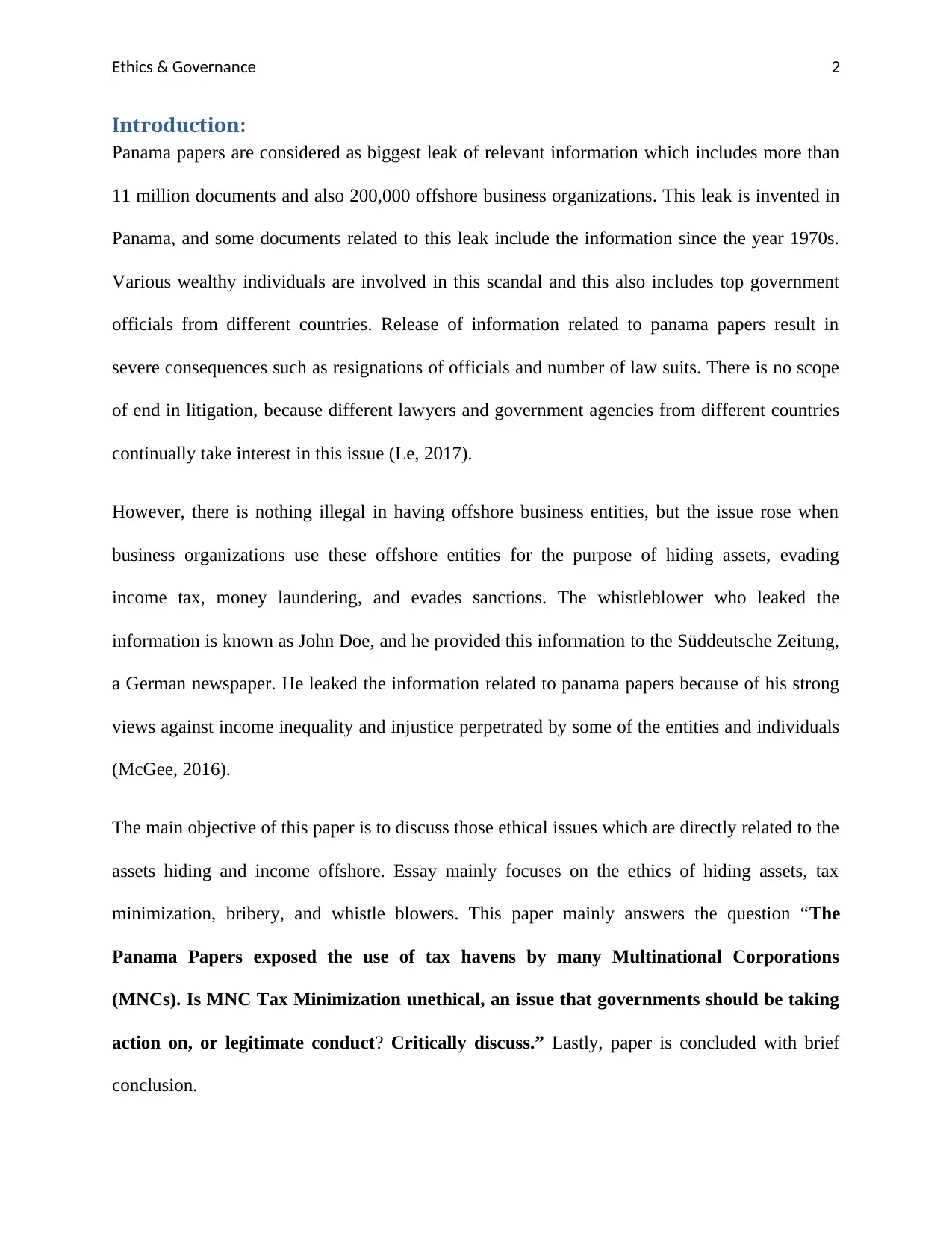
Ethics & Governance 2
Introduction:
Panama papers are considered as biggest leak of relevant information which includes more than
11 million documents and also 200,000 offshore business organizations. This leak is invented in
Panama, and some documents related to this leak include the information since the year 1970s.
Various wealthy individuals are involved in this scandal and this also includes top government
officials from different countries. Release of information related to panama papers result in
severe consequences such as resignations of officials and number of law suits. There is no scope
of end in litigation, because different lawyers and government agencies from different countries
continually take interest in this issue (Le, 2017).
However, there is nothing illegal in having offshore business entities, but the issue rose when
business organizations use these offshore entities for the purpose of hiding assets, evading
income tax, money laundering, and evades sanctions. The whistleblower who leaked the
information is known as John Doe, and he provided this information to the Süddeutsche Zeitung,
a German newspaper. He leaked the information related to panama papers because of his strong
views against income inequality and injustice perpetrated by some of the entities and individuals
(McGee, 2016).
The main objective of this paper is to discuss those ethical issues which are directly related to the
assets hiding and income offshore. Essay mainly focuses on the ethics of hiding assets, tax
minimization, bribery, and whistle blowers. This paper mainly answers the question “The
Panama Papers exposed the use of tax havens by many Multinational Corporations
(MNCs). Is MNC Tax Minimization unethical, an issue that governments should be taking
action on, or legitimate conduct? Critically discuss.” Lastly, paper is concluded with brief
conclusion.
Introduction:
Panama papers are considered as biggest leak of relevant information which includes more than
11 million documents and also 200,000 offshore business organizations. This leak is invented in
Panama, and some documents related to this leak include the information since the year 1970s.
Various wealthy individuals are involved in this scandal and this also includes top government
officials from different countries. Release of information related to panama papers result in
severe consequences such as resignations of officials and number of law suits. There is no scope
of end in litigation, because different lawyers and government agencies from different countries
continually take interest in this issue (Le, 2017).
However, there is nothing illegal in having offshore business entities, but the issue rose when
business organizations use these offshore entities for the purpose of hiding assets, evading
income tax, money laundering, and evades sanctions. The whistleblower who leaked the
information is known as John Doe, and he provided this information to the Süddeutsche Zeitung,
a German newspaper. He leaked the information related to panama papers because of his strong
views against income inequality and injustice perpetrated by some of the entities and individuals
(McGee, 2016).
The main objective of this paper is to discuss those ethical issues which are directly related to the
assets hiding and income offshore. Essay mainly focuses on the ethics of hiding assets, tax
minimization, bribery, and whistle blowers. This paper mainly answers the question “The
Panama Papers exposed the use of tax havens by many Multinational Corporations
(MNCs). Is MNC Tax Minimization unethical, an issue that governments should be taking
action on, or legitimate conduct? Critically discuss.” Lastly, paper is concluded with brief
conclusion.
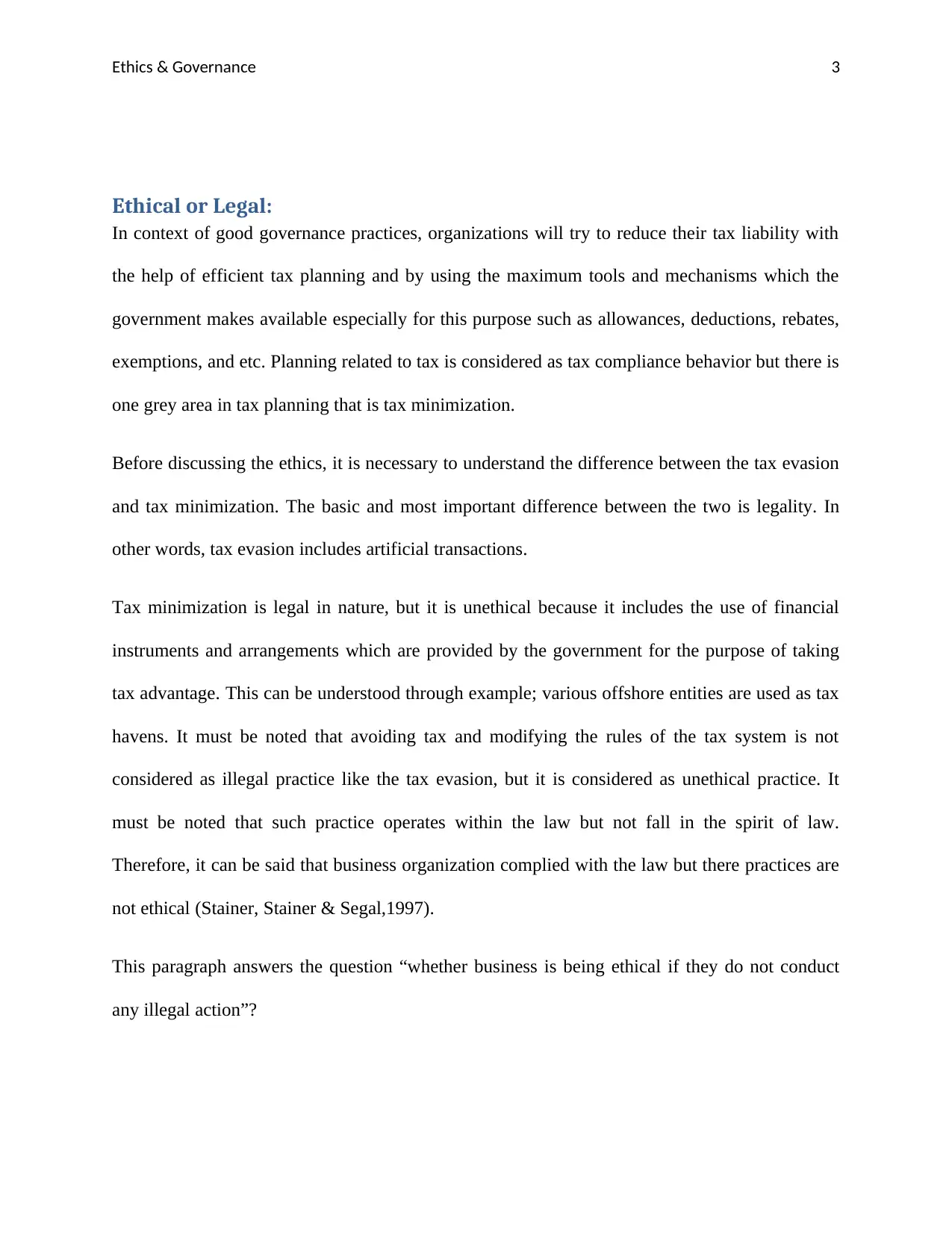
Ethics & Governance 3
Ethical or Legal:
In context of good governance practices, organizations will try to reduce their tax liability with
the help of efficient tax planning and by using the maximum tools and mechanisms which the
government makes available especially for this purpose such as allowances, deductions, rebates,
exemptions, and etc. Planning related to tax is considered as tax compliance behavior but there is
one grey area in tax planning that is tax minimization.
Before discussing the ethics, it is necessary to understand the difference between the tax evasion
and tax minimization. The basic and most important difference between the two is legality. In
other words, tax evasion includes artificial transactions.
Tax minimization is legal in nature, but it is unethical because it includes the use of financial
instruments and arrangements which are provided by the government for the purpose of taking
tax advantage. This can be understood through example; various offshore entities are used as tax
havens. It must be noted that avoiding tax and modifying the rules of the tax system is not
considered as illegal practice like the tax evasion, but it is considered as unethical practice. It
must be noted that such practice operates within the law but not fall in the spirit of law.
Therefore, it can be said that business organization complied with the law but there practices are
not ethical (Stainer, Stainer & Segal,1997).
This paragraph answers the question “whether business is being ethical if they do not conduct
any illegal action”?
Ethical or Legal:
In context of good governance practices, organizations will try to reduce their tax liability with
the help of efficient tax planning and by using the maximum tools and mechanisms which the
government makes available especially for this purpose such as allowances, deductions, rebates,
exemptions, and etc. Planning related to tax is considered as tax compliance behavior but there is
one grey area in tax planning that is tax minimization.
Before discussing the ethics, it is necessary to understand the difference between the tax evasion
and tax minimization. The basic and most important difference between the two is legality. In
other words, tax evasion includes artificial transactions.
Tax minimization is legal in nature, but it is unethical because it includes the use of financial
instruments and arrangements which are provided by the government for the purpose of taking
tax advantage. This can be understood through example; various offshore entities are used as tax
havens. It must be noted that avoiding tax and modifying the rules of the tax system is not
considered as illegal practice like the tax evasion, but it is considered as unethical practice. It
must be noted that such practice operates within the law but not fall in the spirit of law.
Therefore, it can be said that business organization complied with the law but there practices are
not ethical (Stainer, Stainer & Segal,1997).
This paragraph answers the question “whether business is being ethical if they do not conduct
any illegal action”?
⊘ This is a preview!⊘
Do you want full access?
Subscribe today to unlock all pages.

Trusted by 1+ million students worldwide
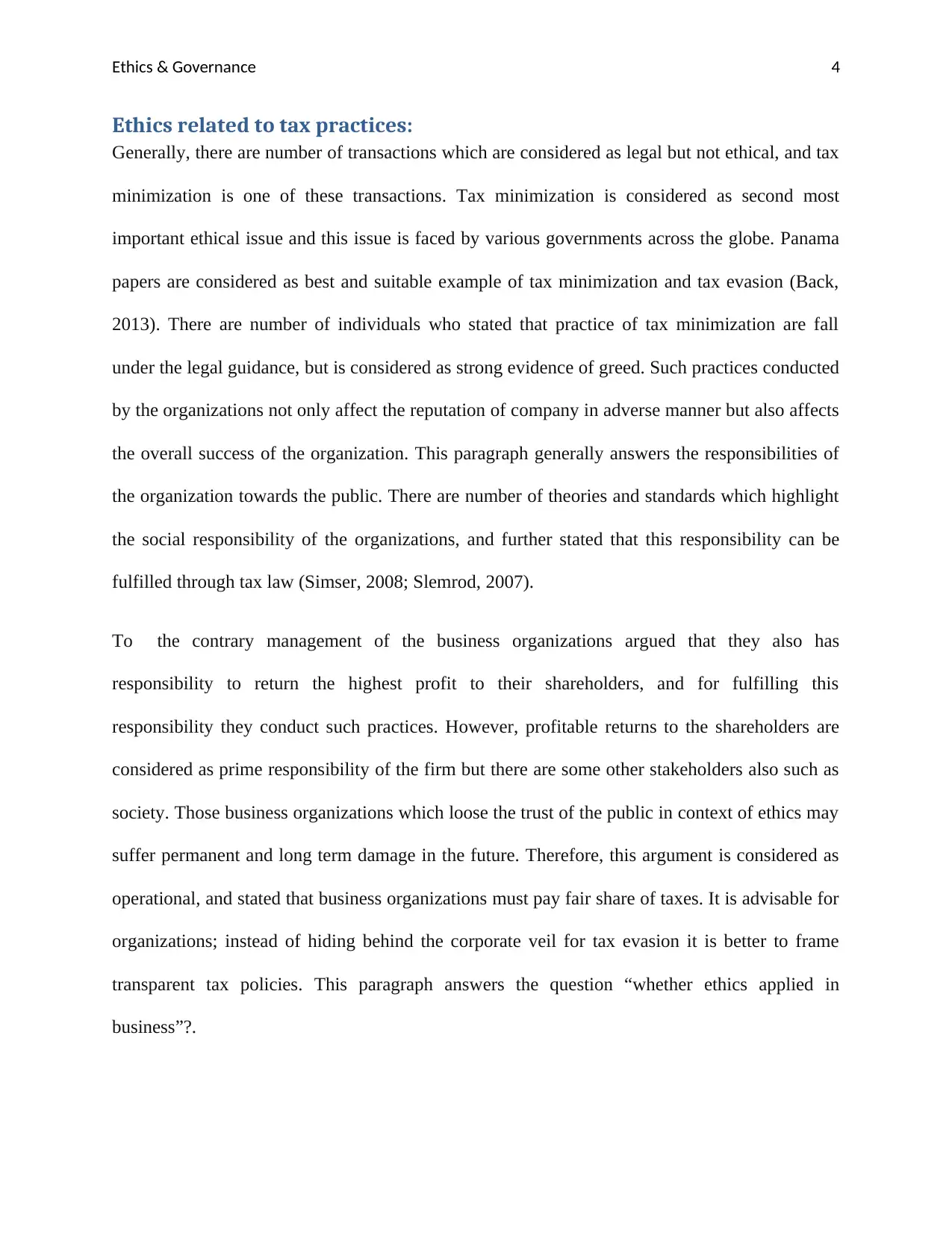
Ethics & Governance 4
Ethics related to tax practices:
Generally, there are number of transactions which are considered as legal but not ethical, and tax
minimization is one of these transactions. Tax minimization is considered as second most
important ethical issue and this issue is faced by various governments across the globe. Panama
papers are considered as best and suitable example of tax minimization and tax evasion (Back,
2013). There are number of individuals who stated that practice of tax minimization are fall
under the legal guidance, but is considered as strong evidence of greed. Such practices conducted
by the organizations not only affect the reputation of company in adverse manner but also affects
the overall success of the organization. This paragraph generally answers the responsibilities of
the organization towards the public. There are number of theories and standards which highlight
the social responsibility of the organizations, and further stated that this responsibility can be
fulfilled through tax law (Simser, 2008; Slemrod, 2007).
To the contrary management of the business organizations argued that they also has
responsibility to return the highest profit to their shareholders, and for fulfilling this
responsibility they conduct such practices. However, profitable returns to the shareholders are
considered as prime responsibility of the firm but there are some other stakeholders also such as
society. Those business organizations which loose the trust of the public in context of ethics may
suffer permanent and long term damage in the future. Therefore, this argument is considered as
operational, and stated that business organizations must pay fair share of taxes. It is advisable for
organizations; instead of hiding behind the corporate veil for tax evasion it is better to frame
transparent tax policies. This paragraph answers the question “whether ethics applied in
business”?.
Ethics related to tax practices:
Generally, there are number of transactions which are considered as legal but not ethical, and tax
minimization is one of these transactions. Tax minimization is considered as second most
important ethical issue and this issue is faced by various governments across the globe. Panama
papers are considered as best and suitable example of tax minimization and tax evasion (Back,
2013). There are number of individuals who stated that practice of tax minimization are fall
under the legal guidance, but is considered as strong evidence of greed. Such practices conducted
by the organizations not only affect the reputation of company in adverse manner but also affects
the overall success of the organization. This paragraph generally answers the responsibilities of
the organization towards the public. There are number of theories and standards which highlight
the social responsibility of the organizations, and further stated that this responsibility can be
fulfilled through tax law (Simser, 2008; Slemrod, 2007).
To the contrary management of the business organizations argued that they also has
responsibility to return the highest profit to their shareholders, and for fulfilling this
responsibility they conduct such practices. However, profitable returns to the shareholders are
considered as prime responsibility of the firm but there are some other stakeholders also such as
society. Those business organizations which loose the trust of the public in context of ethics may
suffer permanent and long term damage in the future. Therefore, this argument is considered as
operational, and stated that business organizations must pay fair share of taxes. It is advisable for
organizations; instead of hiding behind the corporate veil for tax evasion it is better to frame
transparent tax policies. This paragraph answers the question “whether ethics applied in
business”?.
Paraphrase This Document
Need a fresh take? Get an instant paraphrase of this document with our AI Paraphraser
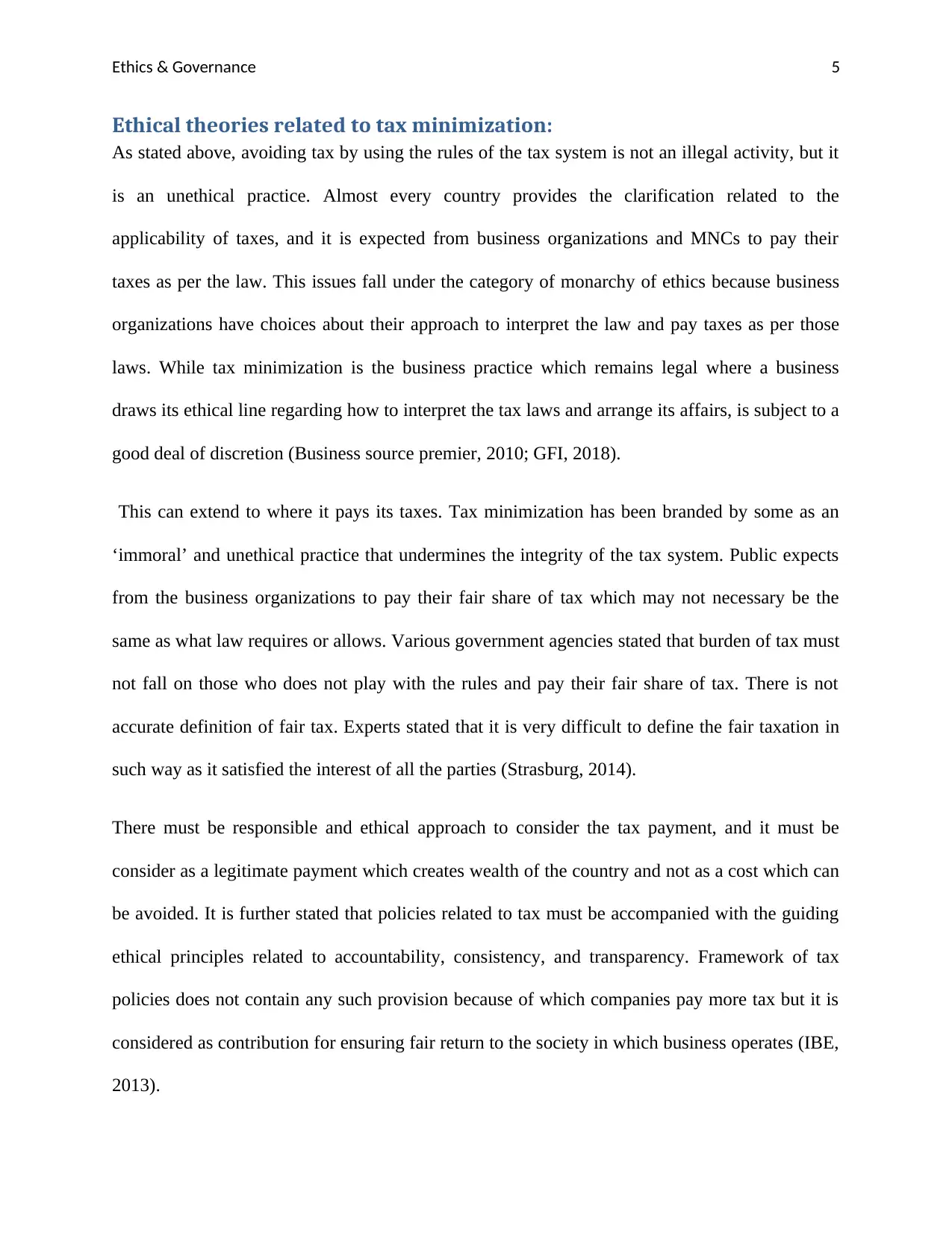
Ethics & Governance 5
Ethical theories related to tax minimization:
As stated above, avoiding tax by using the rules of the tax system is not an illegal activity, but it
is an unethical practice. Almost every country provides the clarification related to the
applicability of taxes, and it is expected from business organizations and MNCs to pay their
taxes as per the law. This issues fall under the category of monarchy of ethics because business
organizations have choices about their approach to interpret the law and pay taxes as per those
laws. While tax minimization is the business practice which remains legal where a business
draws its ethical line regarding how to interpret the tax laws and arrange its affairs, is subject to a
good deal of discretion (Business source premier, 2010; GFI, 2018).
This can extend to where it pays its taxes. Tax minimization has been branded by some as an
‘immoral’ and unethical practice that undermines the integrity of the tax system. Public expects
from the business organizations to pay their fair share of tax which may not necessary be the
same as what law requires or allows. Various government agencies stated that burden of tax must
not fall on those who does not play with the rules and pay their fair share of tax. There is not
accurate definition of fair tax. Experts stated that it is very difficult to define the fair taxation in
such way as it satisfied the interest of all the parties (Strasburg, 2014).
There must be responsible and ethical approach to consider the tax payment, and it must be
consider as a legitimate payment which creates wealth of the country and not as a cost which can
be avoided. It is further stated that policies related to tax must be accompanied with the guiding
ethical principles related to accountability, consistency, and transparency. Framework of tax
policies does not contain any such provision because of which companies pay more tax but it is
considered as contribution for ensuring fair return to the society in which business operates (IBE,
2013).
Ethical theories related to tax minimization:
As stated above, avoiding tax by using the rules of the tax system is not an illegal activity, but it
is an unethical practice. Almost every country provides the clarification related to the
applicability of taxes, and it is expected from business organizations and MNCs to pay their
taxes as per the law. This issues fall under the category of monarchy of ethics because business
organizations have choices about their approach to interpret the law and pay taxes as per those
laws. While tax minimization is the business practice which remains legal where a business
draws its ethical line regarding how to interpret the tax laws and arrange its affairs, is subject to a
good deal of discretion (Business source premier, 2010; GFI, 2018).
This can extend to where it pays its taxes. Tax minimization has been branded by some as an
‘immoral’ and unethical practice that undermines the integrity of the tax system. Public expects
from the business organizations to pay their fair share of tax which may not necessary be the
same as what law requires or allows. Various government agencies stated that burden of tax must
not fall on those who does not play with the rules and pay their fair share of tax. There is not
accurate definition of fair tax. Experts stated that it is very difficult to define the fair taxation in
such way as it satisfied the interest of all the parties (Strasburg, 2014).
There must be responsible and ethical approach to consider the tax payment, and it must be
consider as a legitimate payment which creates wealth of the country and not as a cost which can
be avoided. It is further stated that policies related to tax must be accompanied with the guiding
ethical principles related to accountability, consistency, and transparency. Framework of tax
policies does not contain any such provision because of which companies pay more tax but it is
considered as contribution for ensuring fair return to the society in which business operates (IBE,
2013).
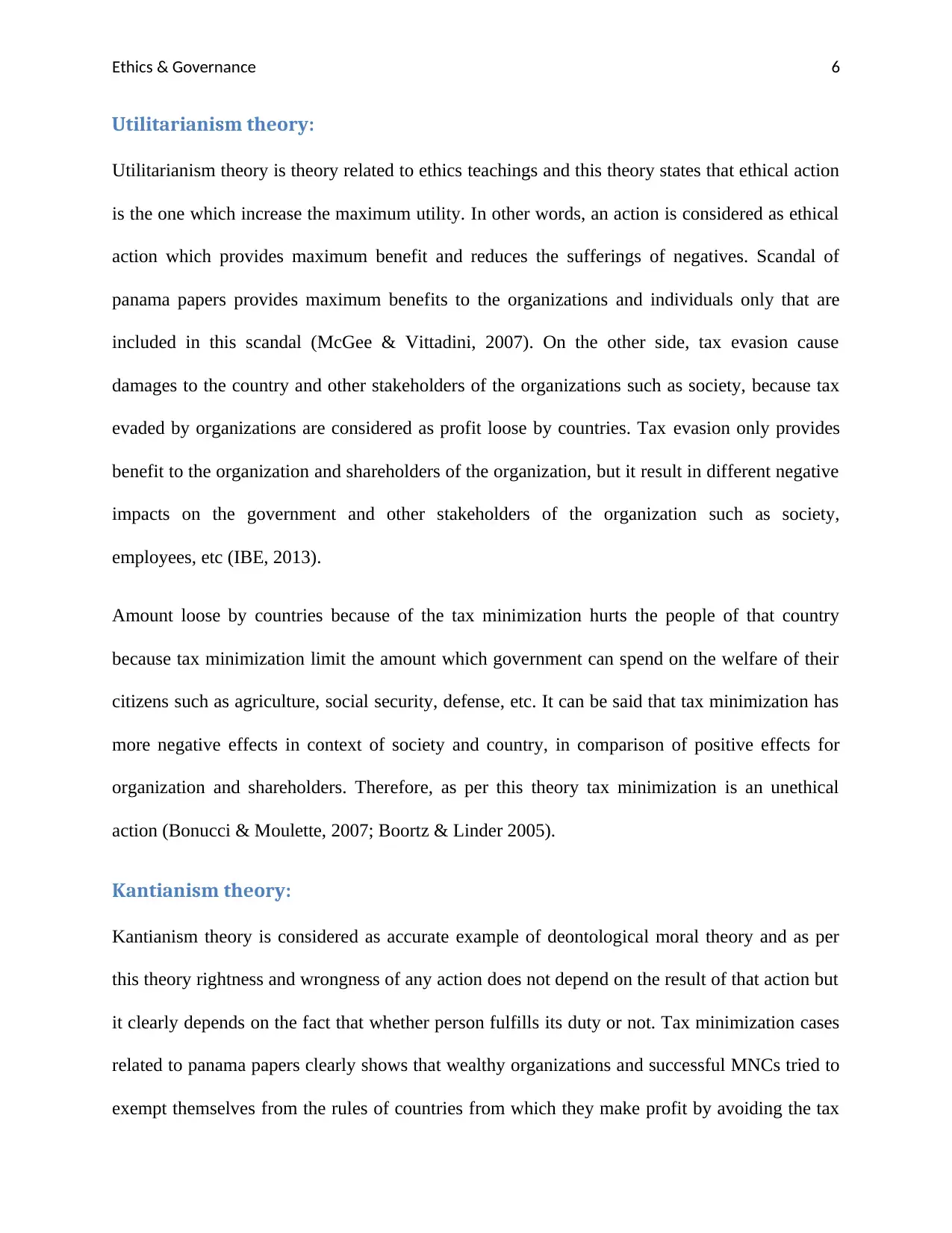
Ethics & Governance 6
Utilitarianism theory:
Utilitarianism theory is theory related to ethics teachings and this theory states that ethical action
is the one which increase the maximum utility. In other words, an action is considered as ethical
action which provides maximum benefit and reduces the sufferings of negatives. Scandal of
panama papers provides maximum benefits to the organizations and individuals only that are
included in this scandal (McGee & Vittadini, 2007). On the other side, tax evasion cause
damages to the country and other stakeholders of the organizations such as society, because tax
evaded by organizations are considered as profit loose by countries. Tax evasion only provides
benefit to the organization and shareholders of the organization, but it result in different negative
impacts on the government and other stakeholders of the organization such as society,
employees, etc (IBE, 2013).
Amount loose by countries because of the tax minimization hurts the people of that country
because tax minimization limit the amount which government can spend on the welfare of their
citizens such as agriculture, social security, defense, etc. It can be said that tax minimization has
more negative effects in context of society and country, in comparison of positive effects for
organization and shareholders. Therefore, as per this theory tax minimization is an unethical
action (Bonucci & Moulette, 2007; Boortz & Linder 2005).
Kantianism theory:
Kantianism theory is considered as accurate example of deontological moral theory and as per
this theory rightness and wrongness of any action does not depend on the result of that action but
it clearly depends on the fact that whether person fulfills its duty or not. Tax minimization cases
related to panama papers clearly shows that wealthy organizations and successful MNCs tried to
exempt themselves from the rules of countries from which they make profit by avoiding the tax
Utilitarianism theory:
Utilitarianism theory is theory related to ethics teachings and this theory states that ethical action
is the one which increase the maximum utility. In other words, an action is considered as ethical
action which provides maximum benefit and reduces the sufferings of negatives. Scandal of
panama papers provides maximum benefits to the organizations and individuals only that are
included in this scandal (McGee & Vittadini, 2007). On the other side, tax evasion cause
damages to the country and other stakeholders of the organizations such as society, because tax
evaded by organizations are considered as profit loose by countries. Tax evasion only provides
benefit to the organization and shareholders of the organization, but it result in different negative
impacts on the government and other stakeholders of the organization such as society,
employees, etc (IBE, 2013).
Amount loose by countries because of the tax minimization hurts the people of that country
because tax minimization limit the amount which government can spend on the welfare of their
citizens such as agriculture, social security, defense, etc. It can be said that tax minimization has
more negative effects in context of society and country, in comparison of positive effects for
organization and shareholders. Therefore, as per this theory tax minimization is an unethical
action (Bonucci & Moulette, 2007; Boortz & Linder 2005).
Kantianism theory:
Kantianism theory is considered as accurate example of deontological moral theory and as per
this theory rightness and wrongness of any action does not depend on the result of that action but
it clearly depends on the fact that whether person fulfills its duty or not. Tax minimization cases
related to panama papers clearly shows that wealthy organizations and successful MNCs tried to
exempt themselves from the rules of countries from which they make profit by avoiding the tax
⊘ This is a preview!⊘
Do you want full access?
Subscribe today to unlock all pages.

Trusted by 1+ million students worldwide
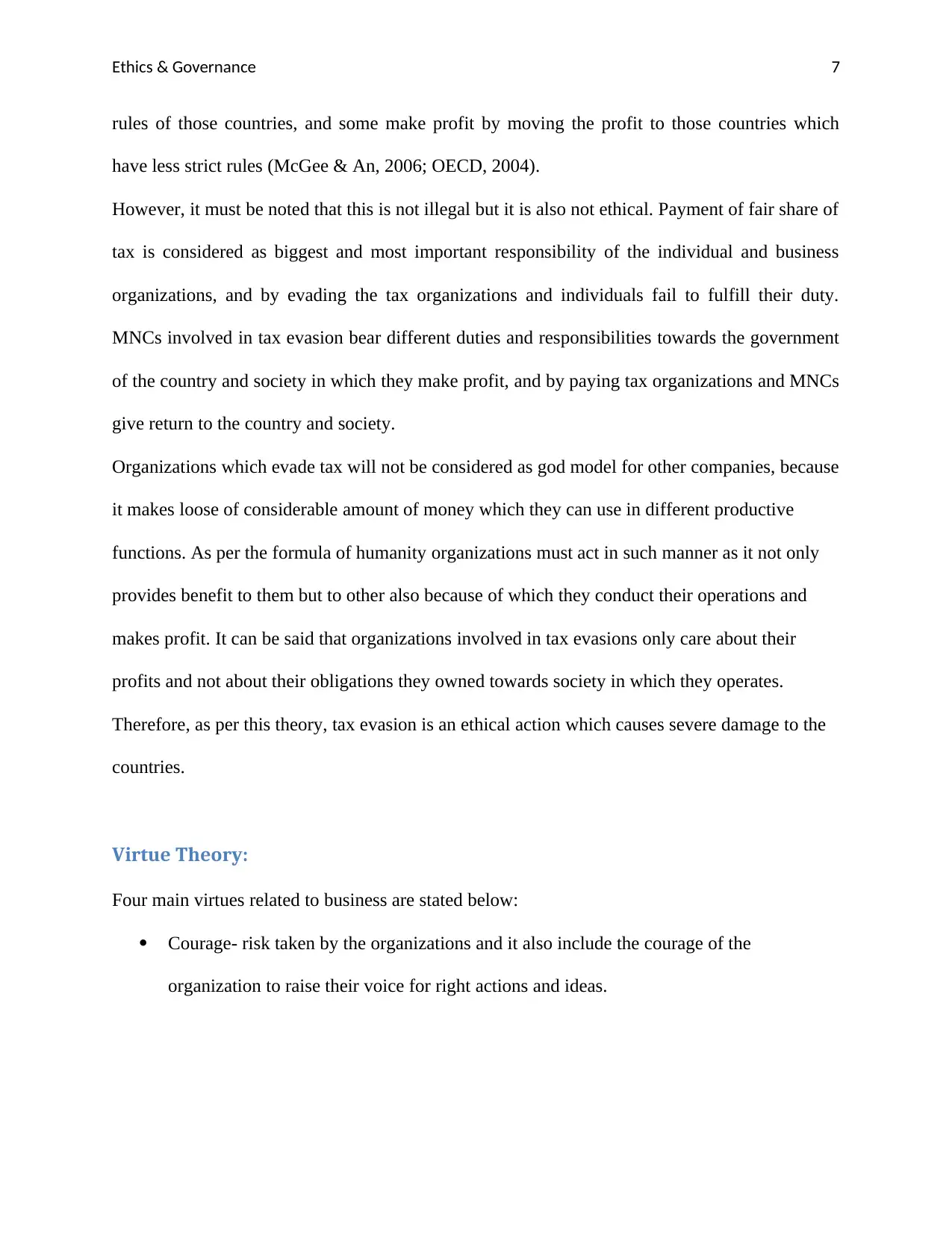
Ethics & Governance 7
rules of those countries, and some make profit by moving the profit to those countries which
have less strict rules (McGee & An, 2006; OECD, 2004).
However, it must be noted that this is not illegal but it is also not ethical. Payment of fair share of
tax is considered as biggest and most important responsibility of the individual and business
organizations, and by evading the tax organizations and individuals fail to fulfill their duty.
MNCs involved in tax evasion bear different duties and responsibilities towards the government
of the country and society in which they make profit, and by paying tax organizations and MNCs
give return to the country and society.
Organizations which evade tax will not be considered as god model for other companies, because
it makes loose of considerable amount of money which they can use in different productive
functions. As per the formula of humanity organizations must act in such manner as it not only
provides benefit to them but to other also because of which they conduct their operations and
makes profit. It can be said that organizations involved in tax evasions only care about their
profits and not about their obligations they owned towards society in which they operates.
Therefore, as per this theory, tax evasion is an ethical action which causes severe damage to the
countries.
Virtue Theory:
Four main virtues related to business are stated below:
Courage- risk taken by the organizations and it also include the courage of the
organization to raise their voice for right actions and ideas.
rules of those countries, and some make profit by moving the profit to those countries which
have less strict rules (McGee & An, 2006; OECD, 2004).
However, it must be noted that this is not illegal but it is also not ethical. Payment of fair share of
tax is considered as biggest and most important responsibility of the individual and business
organizations, and by evading the tax organizations and individuals fail to fulfill their duty.
MNCs involved in tax evasion bear different duties and responsibilities towards the government
of the country and society in which they make profit, and by paying tax organizations and MNCs
give return to the country and society.
Organizations which evade tax will not be considered as god model for other companies, because
it makes loose of considerable amount of money which they can use in different productive
functions. As per the formula of humanity organizations must act in such manner as it not only
provides benefit to them but to other also because of which they conduct their operations and
makes profit. It can be said that organizations involved in tax evasions only care about their
profits and not about their obligations they owned towards society in which they operates.
Therefore, as per this theory, tax evasion is an ethical action which causes severe damage to the
countries.
Virtue Theory:
Four main virtues related to business are stated below:
Courage- risk taken by the organizations and it also include the courage of the
organization to raise their voice for right actions and ideas.
Paraphrase This Document
Need a fresh take? Get an instant paraphrase of this document with our AI Paraphraser
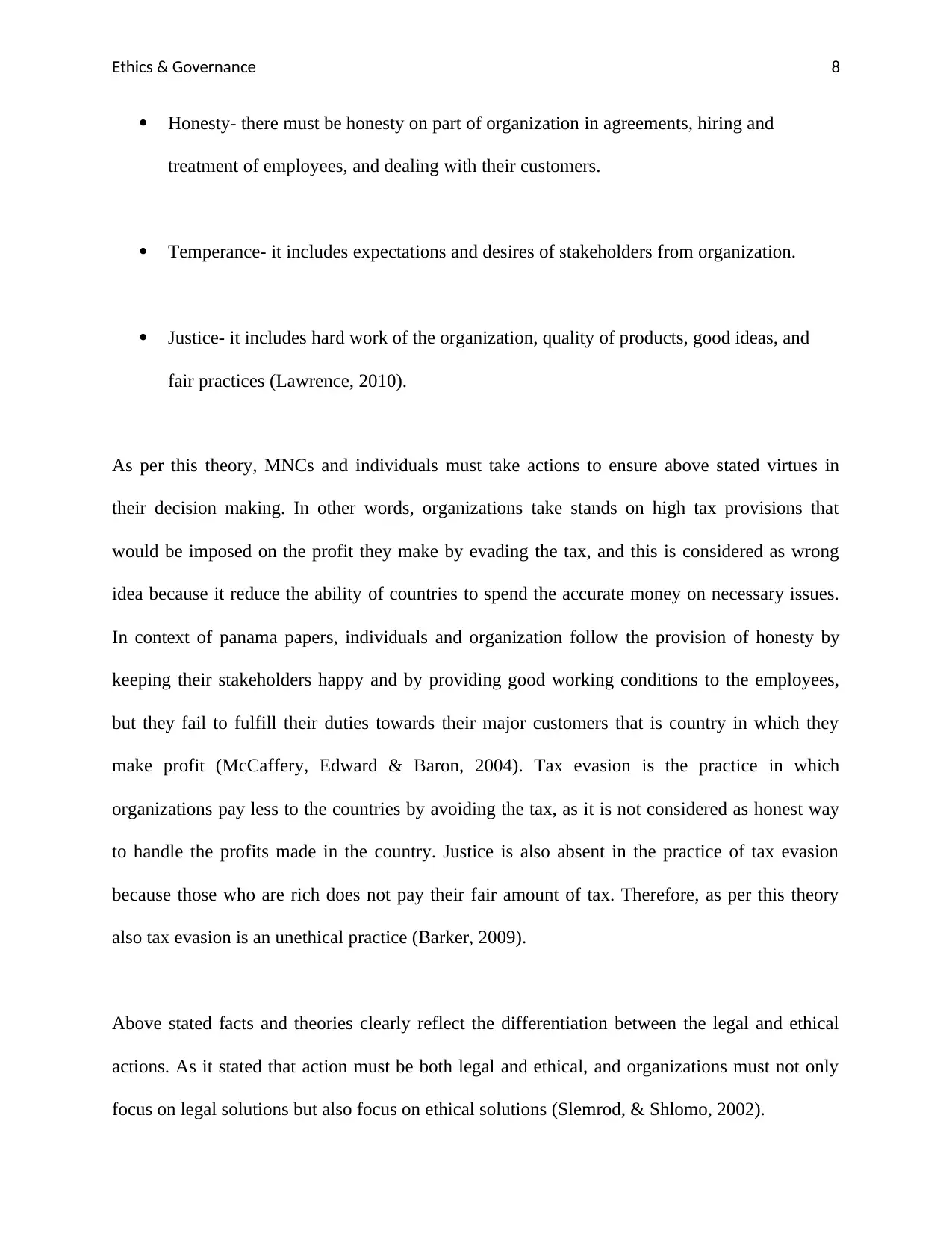
Ethics & Governance 8
Honesty- there must be honesty on part of organization in agreements, hiring and
treatment of employees, and dealing with their customers.
Temperance- it includes expectations and desires of stakeholders from organization.
Justice- it includes hard work of the organization, quality of products, good ideas, and
fair practices (Lawrence, 2010).
As per this theory, MNCs and individuals must take actions to ensure above stated virtues in
their decision making. In other words, organizations take stands on high tax provisions that
would be imposed on the profit they make by evading the tax, and this is considered as wrong
idea because it reduce the ability of countries to spend the accurate money on necessary issues.
In context of panama papers, individuals and organization follow the provision of honesty by
keeping their stakeholders happy and by providing good working conditions to the employees,
but they fail to fulfill their duties towards their major customers that is country in which they
make profit (McCaffery, Edward & Baron, 2004). Tax evasion is the practice in which
organizations pay less to the countries by avoiding the tax, as it is not considered as honest way
to handle the profits made in the country. Justice is also absent in the practice of tax evasion
because those who are rich does not pay their fair amount of tax. Therefore, as per this theory
also tax evasion is an unethical practice (Barker, 2009).
Above stated facts and theories clearly reflect the differentiation between the legal and ethical
actions. As it stated that action must be both legal and ethical, and organizations must not only
focus on legal solutions but also focus on ethical solutions (Slemrod, & Shlomo, 2002).
Honesty- there must be honesty on part of organization in agreements, hiring and
treatment of employees, and dealing with their customers.
Temperance- it includes expectations and desires of stakeholders from organization.
Justice- it includes hard work of the organization, quality of products, good ideas, and
fair practices (Lawrence, 2010).
As per this theory, MNCs and individuals must take actions to ensure above stated virtues in
their decision making. In other words, organizations take stands on high tax provisions that
would be imposed on the profit they make by evading the tax, and this is considered as wrong
idea because it reduce the ability of countries to spend the accurate money on necessary issues.
In context of panama papers, individuals and organization follow the provision of honesty by
keeping their stakeholders happy and by providing good working conditions to the employees,
but they fail to fulfill their duties towards their major customers that is country in which they
make profit (McCaffery, Edward & Baron, 2004). Tax evasion is the practice in which
organizations pay less to the countries by avoiding the tax, as it is not considered as honest way
to handle the profits made in the country. Justice is also absent in the practice of tax evasion
because those who are rich does not pay their fair amount of tax. Therefore, as per this theory
also tax evasion is an unethical practice (Barker, 2009).
Above stated facts and theories clearly reflect the differentiation between the legal and ethical
actions. As it stated that action must be both legal and ethical, and organizations must not only
focus on legal solutions but also focus on ethical solutions (Slemrod, & Shlomo, 2002).
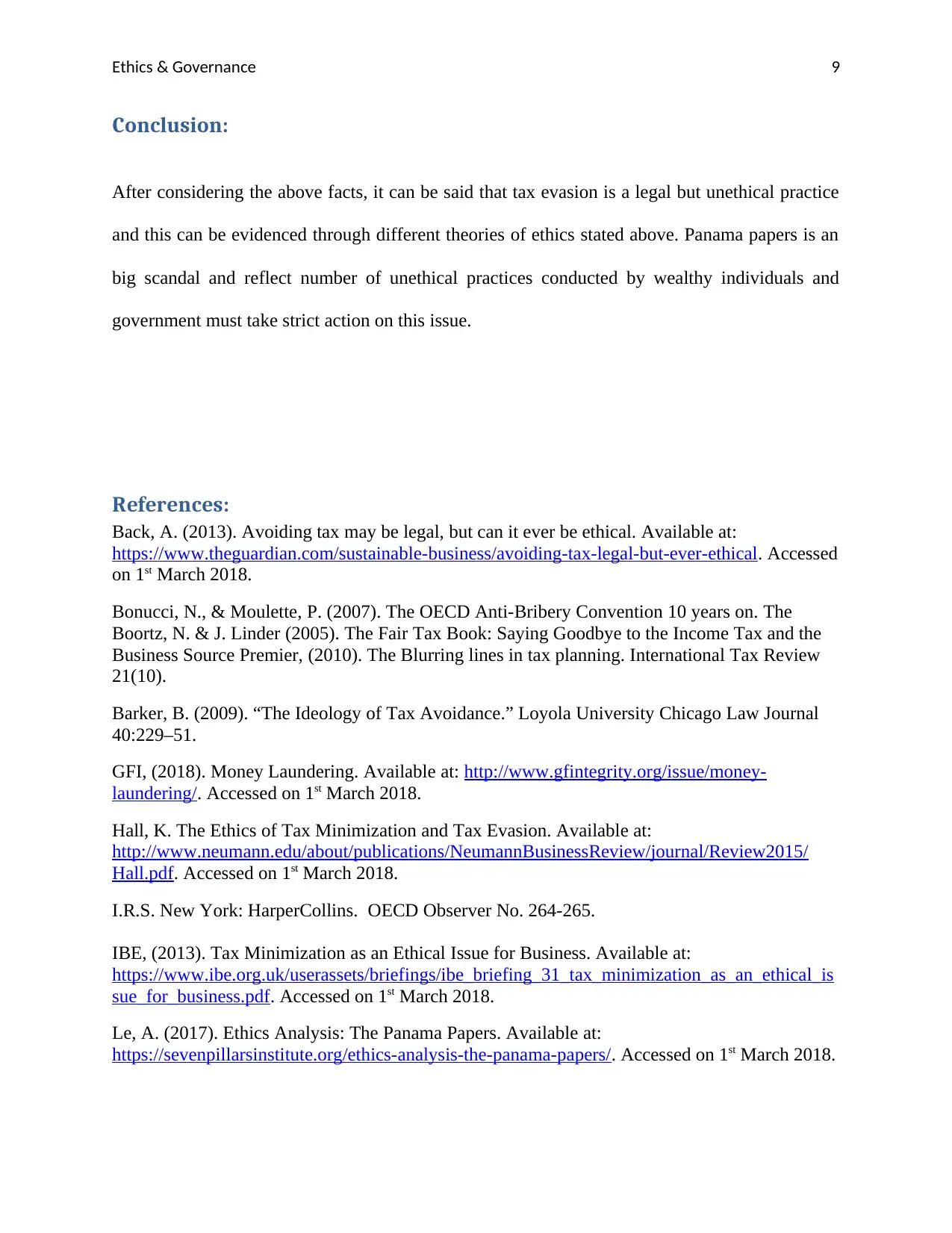
Ethics & Governance 9
Conclusion:
After considering the above facts, it can be said that tax evasion is a legal but unethical practice
and this can be evidenced through different theories of ethics stated above. Panama papers is an
big scandal and reflect number of unethical practices conducted by wealthy individuals and
government must take strict action on this issue.
References:
Back, A. (2013). Avoiding tax may be legal, but can it ever be ethical. Available at:
https://www.theguardian.com/sustainable-business/avoiding-tax-legal-but-ever-ethical. Accessed
on 1st March 2018.
Bonucci, N., & Moulette, P. (2007). The OECD Anti-Bribery Convention 10 years on. The
Boortz, N. & J. Linder (2005). The Fair Tax Book: Saying Goodbye to the Income Tax and the
Business Source Premier, (2010). The Blurring lines in tax planning. International Tax Review
21(10).
Barker, B. (2009). “The Ideology of Tax Avoidance.” Loyola University Chicago Law Journal
40:229–51.
GFI, (2018). Money Laundering. Available at: http://www.gfintegrity.org/issue/money-
laundering/. Accessed on 1st March 2018.
Hall, K. The Ethics of Tax Minimization and Tax Evasion. Available at:
http://www.neumann.edu/about/publications/NeumannBusinessReview/journal/Review2015/
Hall.pdf. Accessed on 1st March 2018.
I.R.S. New York: HarperCollins. OECD Observer No. 264-265.
IBE, (2013). Tax Minimization as an Ethical Issue for Business. Available at:
https://www.ibe.org.uk/userassets/briefings/ibe_briefing_31_tax_minimization_as_an_ethical_is
sue_for_business.pdf. Accessed on 1st March 2018.
Le, A. (2017). Ethics Analysis: The Panama Papers. Available at:
https://sevenpillarsinstitute.org/ethics-analysis-the-panama-papers/. Accessed on 1st March 2018.
Conclusion:
After considering the above facts, it can be said that tax evasion is a legal but unethical practice
and this can be evidenced through different theories of ethics stated above. Panama papers is an
big scandal and reflect number of unethical practices conducted by wealthy individuals and
government must take strict action on this issue.
References:
Back, A. (2013). Avoiding tax may be legal, but can it ever be ethical. Available at:
https://www.theguardian.com/sustainable-business/avoiding-tax-legal-but-ever-ethical. Accessed
on 1st March 2018.
Bonucci, N., & Moulette, P. (2007). The OECD Anti-Bribery Convention 10 years on. The
Boortz, N. & J. Linder (2005). The Fair Tax Book: Saying Goodbye to the Income Tax and the
Business Source Premier, (2010). The Blurring lines in tax planning. International Tax Review
21(10).
Barker, B. (2009). “The Ideology of Tax Avoidance.” Loyola University Chicago Law Journal
40:229–51.
GFI, (2018). Money Laundering. Available at: http://www.gfintegrity.org/issue/money-
laundering/. Accessed on 1st March 2018.
Hall, K. The Ethics of Tax Minimization and Tax Evasion. Available at:
http://www.neumann.edu/about/publications/NeumannBusinessReview/journal/Review2015/
Hall.pdf. Accessed on 1st March 2018.
I.R.S. New York: HarperCollins. OECD Observer No. 264-265.
IBE, (2013). Tax Minimization as an Ethical Issue for Business. Available at:
https://www.ibe.org.uk/userassets/briefings/ibe_briefing_31_tax_minimization_as_an_ethical_is
sue_for_business.pdf. Accessed on 1st March 2018.
Le, A. (2017). Ethics Analysis: The Panama Papers. Available at:
https://sevenpillarsinstitute.org/ethics-analysis-the-panama-papers/. Accessed on 1st March 2018.
⊘ This is a preview!⊘
Do you want full access?
Subscribe today to unlock all pages.

Trusted by 1+ million students worldwide
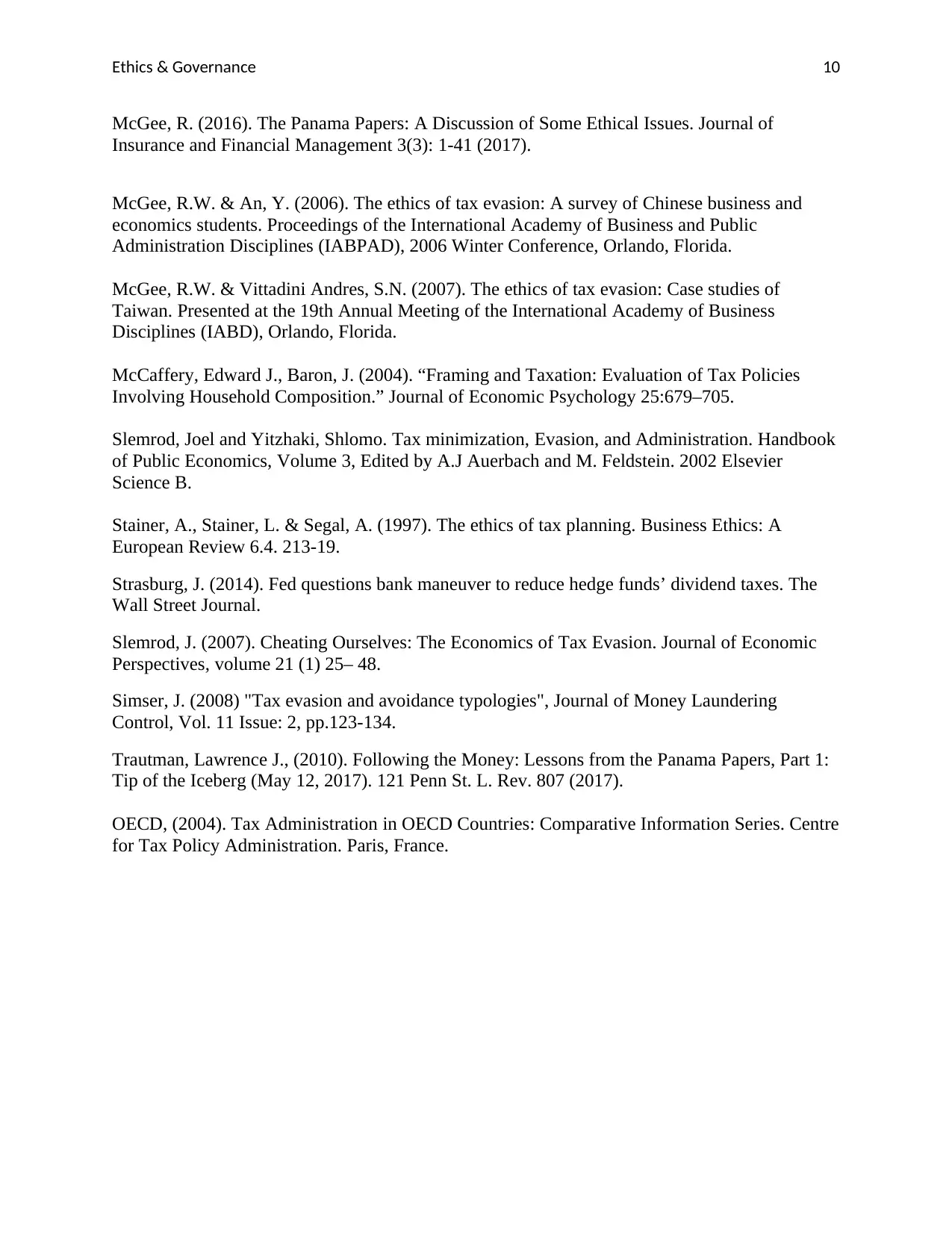
Ethics & Governance 10
McGee, R. (2016). The Panama Papers: A Discussion of Some Ethical Issues. Journal of
Insurance and Financial Management 3(3): 1-41 (2017).
McGee, R.W. & An, Y. (2006). The ethics of tax evasion: A survey of Chinese business and
economics students. Proceedings of the International Academy of Business and Public
Administration Disciplines (IABPAD), 2006 Winter Conference, Orlando, Florida.
McGee, R.W. & Vittadini Andres, S.N. (2007). The ethics of tax evasion: Case studies of
Taiwan. Presented at the 19th Annual Meeting of the International Academy of Business
Disciplines (IABD), Orlando, Florida.
McCaffery, Edward J., Baron, J. (2004). “Framing and Taxation: Evaluation of Tax Policies
Involving Household Composition.” Journal of Economic Psychology 25:679–705.
Slemrod, Joel and Yitzhaki, Shlomo. Tax minimization, Evasion, and Administration. Handbook
of Public Economics, Volume 3, Edited by A.J Auerbach and M. Feldstein. 2002 Elsevier
Science B.
Stainer, A., Stainer, L. & Segal, A. (1997). The ethics of tax planning. Business Ethics: A
European Review 6.4. 213-19.
Strasburg, J. (2014). Fed questions bank maneuver to reduce hedge funds’ dividend taxes. The
Wall Street Journal.
Slemrod, J. (2007). Cheating Ourselves: The Economics of Tax Evasion. Journal of Economic
Perspectives, volume 21 (1) 25– 48.
Simser, J. (2008) "Tax evasion and avoidance typologies", Journal of Money Laundering
Control, Vol. 11 Issue: 2, pp.123-134.
Trautman, Lawrence J., (2010). Following the Money: Lessons from the Panama Papers, Part 1:
Tip of the Iceberg (May 12, 2017). 121 Penn St. L. Rev. 807 (2017).
OECD, (2004). Tax Administration in OECD Countries: Comparative Information Series. Centre
for Tax Policy Administration. Paris, France.
McGee, R. (2016). The Panama Papers: A Discussion of Some Ethical Issues. Journal of
Insurance and Financial Management 3(3): 1-41 (2017).
McGee, R.W. & An, Y. (2006). The ethics of tax evasion: A survey of Chinese business and
economics students. Proceedings of the International Academy of Business and Public
Administration Disciplines (IABPAD), 2006 Winter Conference, Orlando, Florida.
McGee, R.W. & Vittadini Andres, S.N. (2007). The ethics of tax evasion: Case studies of
Taiwan. Presented at the 19th Annual Meeting of the International Academy of Business
Disciplines (IABD), Orlando, Florida.
McCaffery, Edward J., Baron, J. (2004). “Framing and Taxation: Evaluation of Tax Policies
Involving Household Composition.” Journal of Economic Psychology 25:679–705.
Slemrod, Joel and Yitzhaki, Shlomo. Tax minimization, Evasion, and Administration. Handbook
of Public Economics, Volume 3, Edited by A.J Auerbach and M. Feldstein. 2002 Elsevier
Science B.
Stainer, A., Stainer, L. & Segal, A. (1997). The ethics of tax planning. Business Ethics: A
European Review 6.4. 213-19.
Strasburg, J. (2014). Fed questions bank maneuver to reduce hedge funds’ dividend taxes. The
Wall Street Journal.
Slemrod, J. (2007). Cheating Ourselves: The Economics of Tax Evasion. Journal of Economic
Perspectives, volume 21 (1) 25– 48.
Simser, J. (2008) "Tax evasion and avoidance typologies", Journal of Money Laundering
Control, Vol. 11 Issue: 2, pp.123-134.
Trautman, Lawrence J., (2010). Following the Money: Lessons from the Panama Papers, Part 1:
Tip of the Iceberg (May 12, 2017). 121 Penn St. L. Rev. 807 (2017).
OECD, (2004). Tax Administration in OECD Countries: Comparative Information Series. Centre
for Tax Policy Administration. Paris, France.
1 out of 10
Related Documents
Your All-in-One AI-Powered Toolkit for Academic Success.
+13062052269
info@desklib.com
Available 24*7 on WhatsApp / Email
![[object Object]](/_next/static/media/star-bottom.7253800d.svg)
Unlock your academic potential
Copyright © 2020–2026 A2Z Services. All Rights Reserved. Developed and managed by ZUCOL.




